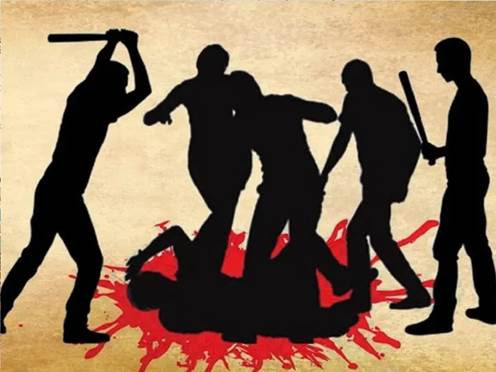Description

Copyright infringement not intended
In News
- The recent incident of the beheading of a man in Rajasthan’s Udaipur has again raised the concern over increasing hate crime in India.
- India has no specific law to deal with mob lynching or Hate crimes, therefore many notable individuals and social activists have demanded the government to pass a strong law to deal with the issues.
What is Lynching?
- Any act or series of acts of violence or aiding, encouraging such act/acts by a mob on the grounds of religion, race, caste, sex, place of birth, language, dietary practices, sexual orientation, political affiliation, ethnicity or any other related grounds.
Concern
- It is against the rule of law, against human rights.
- It fuels Communalism and Casteism, with no database to analyze trends.
- It reflects the loss of faith of people in the judicial/democratic system.
- Misinformation and Propaganda spread through platforms like Facebook and Whatsapp.
- Covered by International Media, giving India a bad image and can hurt tourism and also a foreign investment.
Steps need to be taken
- Focus needed on social/attitudinal change.
- Strengthening administration and governance to ensure public confidence in state institutions.
- Holding Social media platforms accountable.
- Designate a senior Police officer in each district for taking measures to prevent incidents of mob violence and lynching.
- Identify districts, sub-divisions and villages where instances of lynching and mob violence have been reported in the recent past.
- Broadcast on radio, television and other media platforms about the serious consequences of mob lynching and mob violence.
- State Governments shall prepare a lynching/mob violence victim compensation scheme.
- Need for an anti-lynching law, at present there is no law that Criminalizes mob killings.
To end mob lynching, Supreme Court gives an 11-point prescription:
- The State governments shall designate a senior police officer in each district for taking measures to prevent incidents of mob violence and lynching.
- The state governments shall immediately identify districts, sub-divisions and villages where instances of lynching and mob violence have been reported in the recent past.
- The nodal officers shall bring to the notice of the DGP any inter-district coordination issues for devising a strategy to tackle lynching and mob violence-related issues.
- It shall be the duty of every police officer to cause a mob to disperse, which, in his opinion, tends to cause violence in the disguise of vigilantism or otherwise.
- Central and the state governments should broadcast on radio and television and other media platforms including the official websites that lynching and mob violence shall invite serious consequences.
- Curb and stop the dissemination of irresponsible and explosive messages, videos and other material on various social media platforms. Register FIR under relevant provisions of law against persons who disseminate such messages.
- Ensure that there is no further harassment of the family members of the victims.
- State governments shall prepare a lynching/mob violence victim compensation scheme.
- Cases of lynching and mob violence shall be specifically tried by designated court/fast track courts earmarked for that purpose in each district. The trial shall preferably be concluded within 6 months.
- To set a stern example in cases of mob violence and lynching, the trial court must ordinarily award the maximum sentence upon conviction of the accused person.
- If it is found that a police officer or an officer of the district administration has failed to fulfil his duty, it will be considered an act of deliberate negligence.
Way forward
- The National Crime Records Bureau (NCRB) does not maintain specific data with respect to lynching incidents in the country.
- ‘Police’ and ‘Public Order are State subjects under the Seventh Schedule to the Constitution of India. The responsibility to maintain law and order and protect life and property, therefore, rests with the respective State Governments.
- Manipur became the first to pass a law against lynching. Manipur’s Anti-Lynching law laid down the duty and responsibility of the State Government to make arrangements for the protection of victims and witnesses against any kind of intimidation, coercion, inducement, violence etc.
- It prescribes the duty of the State officials to prevent a hostile environment against people of the community, who has been lynched.
- Intolerant citizens violating the freedoms of fellow citizens have no right to be ‘Indians’ as it goes against the Core values and ethos of India, Core Indian values and ethos have no place for intolerance due to which all the major religions of the world are flourishing in India.
https://www.indiatoday.in/india/story/udaipur-killing-hate-speech-religious-crime-laws-in-india-1968563-2022-06-30
1.png)
https://t.me/+hJqMV1O0se03Njk9













